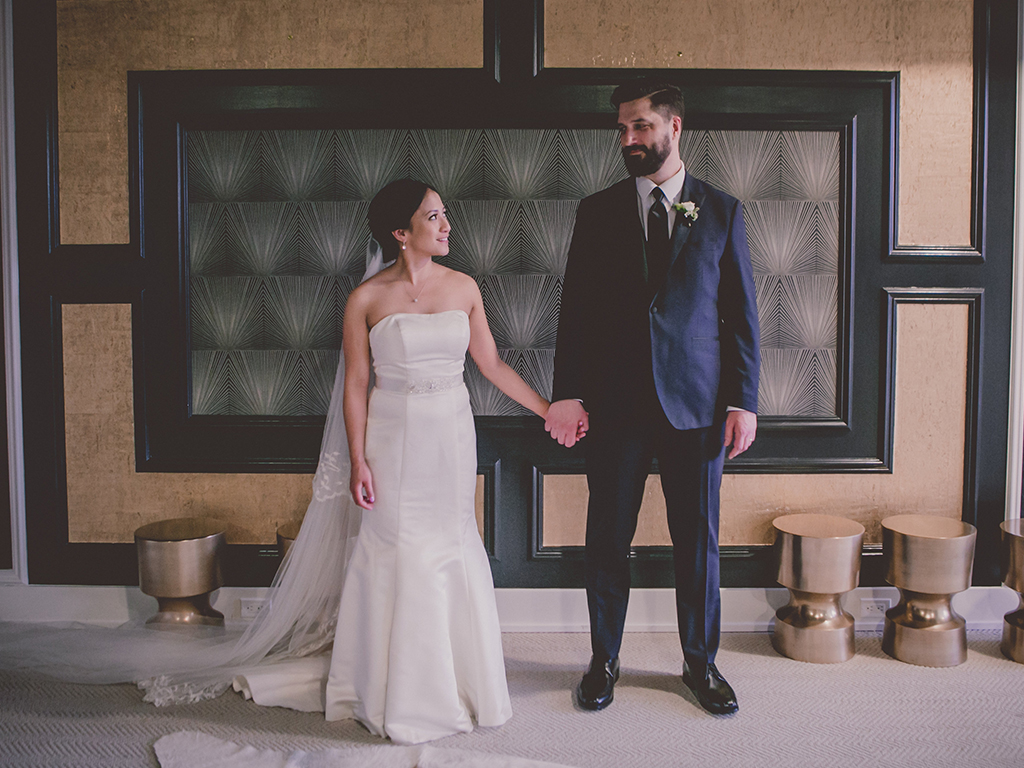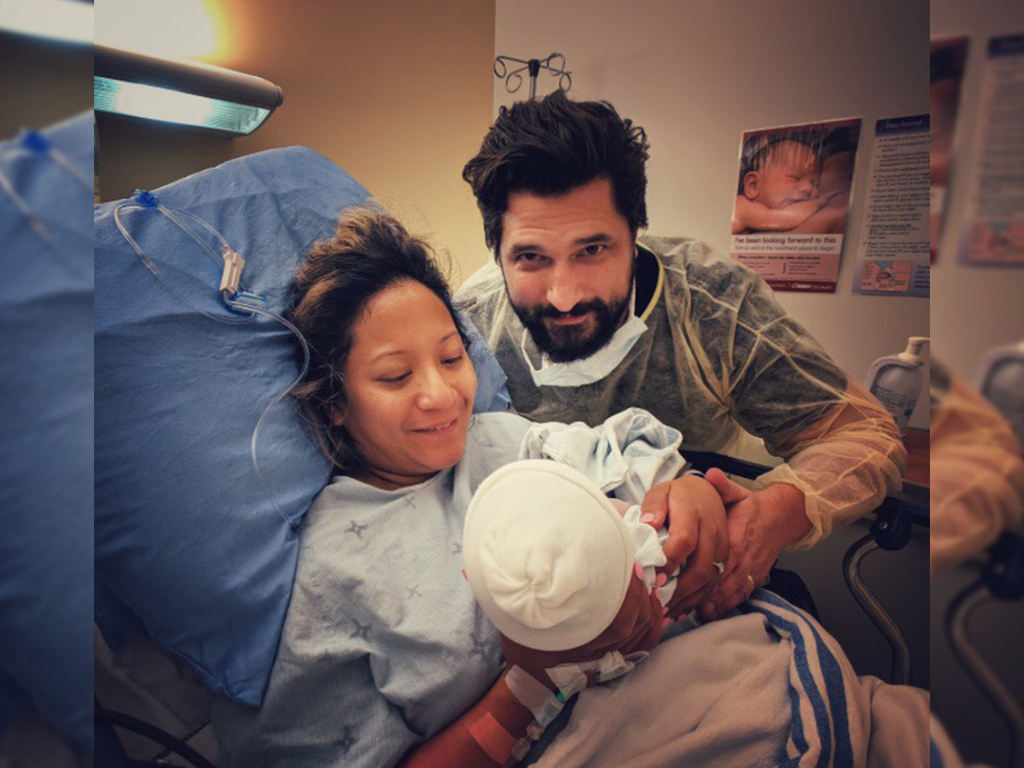When 32-year-old Anthony Schieck took his wife’s last name, he felt really good about his decision.

Schieck wasn’t attached to his own last name since his father isn’t a part of his life, and he wanted to share a last name with his partner. Through conversations, it became clear to Schieck that his spouse’s last name was significant to her.
“Her family name was more important to her than my name was to me, which I think was really the main point in my own deliberation on the topic,” Schieck, who lives in P.E.I., told Global News.
“Why would I ask my wife to take a last name that I didn’t even really want to pass on to my kids?”
And so, when they got hitched in 2017, Anthony become a Schieck. He’s since legally changed his name on all government ID.
READ MORE: From bridesmaid to stranger — How weddings can destroy friendships
“Not surprisingly, women have been significantly more enthusiastic about it when I’ve talked to them about my name change,” Schieck said.
“It’s like the thought has never crossed the mind of the vast majority of men I’ve spoken to.”
Are more men taking women’s names?
Schieck is a bit of a unicorn. Brian Powell, a sociology professor at Indiana University, says men taking women’s last names in heterosexual relationships is a “very, very rare event.”
“The cultural norm still is overwhelmingly that men do not change their name at marriage,” Powell told Global News. “Almost every man who’s getting married to a woman is not going to be changing his name.”
WATCH: ‘Global News Morning’ explores the growing trend in green weddings
_848x480_1516784195972.jpg?w=1040&quality=70&strip=all)
Powell, who researches gender, sexuality and family issues, says if there is an increase in North American men taking their wives’ last names, it’s not by much. For instance, Powell says, if half of one per cent of men took their wives’ last names in the past, maybe one per cent do now.
“In terms of behavioural change, the change has been fairly small,” he said.
Research also shows that gender norms still have a hold on society.
According to a 2017 study out of Portland State University, 70 per cent of respondents said women should take their husband’s last name in marriage.
COMMENTARY: Why you should keep your last name once you’re married
The most common reason people felt this way was because they believed women should prioritize their marriage and family ahead of themselves, and taking their husband’s last name symbolized that, according to the study.
Why few men take women’s last names
Kristin Kelley is a doctoral candidate in the Department of Sociology at Indiana University whose dissertation focuses on men who take their wives’ last names and women who keep their names.
Kelley’s research has painted an interesting picture: she says that because of gender norms, men — and women — have complicated feelings about husbands changing their names. Traditionally, in the U.S. and Canada (and other parts of the world), women take their husband’s last name in marriage. Flipping the script on this narrative can evoke a reaction, Kelley says.

Get breaking National news
WATCH: 15% of Canadians wouldn’t consider an interracial marriage — Ipsos poll

Kelley said men who take women’s names are also viewed as “lower status” and may be less respected by other men. They may also be seen as overly loving and less selfish — characteristics that relate to gender theory — Kelley added.
According to Kelley, in heterosexual relationships, women and men are traditionally expected to fill certain roles. Generally speaking, women are conditioned to sacrifice their own personal identity for the family, whereas men are expected to be the “head of the household” or the breadwinner, she said.
READ MORE: Why more millennials are refusing to blow the bank on their weddings
A 2018 study on how education level correlates with name choice echoes Kelley’s findings. The study found that men with higher education and good jobs were less likely to change their name because they could lose professional status if they did so.
On the other hand, men with less education than their wife were also not inclined to change their name because they were expected to maintain a sense of power in the relationship — if they weren’t breadwinners, holding onto their own name helped compensate for that, the study found.
How do women feel?
Women also have complicated feelings about last names, Kelley says. Based on the data she’s collected, many women support tradition and are happy to take their husband’s name.
WATCH: What is a prenup and why should you get one?

“I love being a woman and having my own identity separate from my husband but I also like feeling as if we’re a part of something or in this together by having the same last name,” said one woman who Kelley interviewed for her dissertation research.
Others interviewed by Kelley were resistant to the idea of a man taking their last name, she said.
“I think people would be taken aback a little by the strangeness of taking the woman’s last name,” another female respondent told her. “It goes against social norms, and most people would see that as the woman stepping all over the man rather than a couple making a decision for their family.”
For 36-year-old Carolina Gonzaga, having her husband Mark take her last name when they married in 2018 was a meaningful act. The Toronto-based stand-up comedian said she is thrilled to share her name with her partner.
The couple welcomed their first child, named Ziggy, in early August, and now all three share the same last name.
READ MORE: ‘Roughest period of my life’ — The emotional trauma of calling off a wedding
“I am proud of Mark for doing something that many see as radical,” she told Global News.
“To him, it’s simply our last name, but it’s a teachable moment for our daughter that anything is possible — regardless of what is seen as standard or conventional.”
Why some men take their wife’s last name
Mark, 41, was open to having a new last name and said he and Carolina had the talk before they were engaged.
“I thought it would be fun to have a new last name and mentioned on a date … that I’d probably be open to taking her last name if we got married,” Mark said.
“Carolina was super excited about keeping her Filipino last name, and we wanted to have one family name so it was the best option.”
Mark, who works as a DJ, says that when most people find out he took his wife’s name, they are “floored.”
“I didn’t think it was that big of a deal, but I suppose it’s rare,” he said.
Powell says that when a man decides to take a woman’s last name, the most common reasons include the man not liking his own last name, not feeling attached to his family name or making a political statement.
WATCH: Could you be married but living apart?

“It also could be a recognition of family configuration for both,” he added.
Future of last names
Same-sex couples also have to navigate last name conversations. Powell says that commonly, men who are married to men may decide to keep their own last names, with some spouses taking on a hyphenated last name.
For women who marry women, the naming patterns may not be as clear, Powell says. Lesbian couples may keep their names or share a family name.
READ MORE: 1 in 4 Canadians still oppose full same-sex marriage rights — poll
In order to shift people’s attitudes on gender roles, equality and marriage, behaviour has to change, Kelley says. For men taking women’s last names to become normalized, couples need to be willing to challenge societal norms.
“One way that we can change people’s ideas about what it means to be a woman or a man… is for men to actually do things that are considered feminine,” Kelley said.
“We need more men to enter female-dominated occupations and we need more men to hyphenate or change their names.”
Laura.hensley@globalnews.ca










Comments
Want to discuss? Please read our Commenting Policy first.